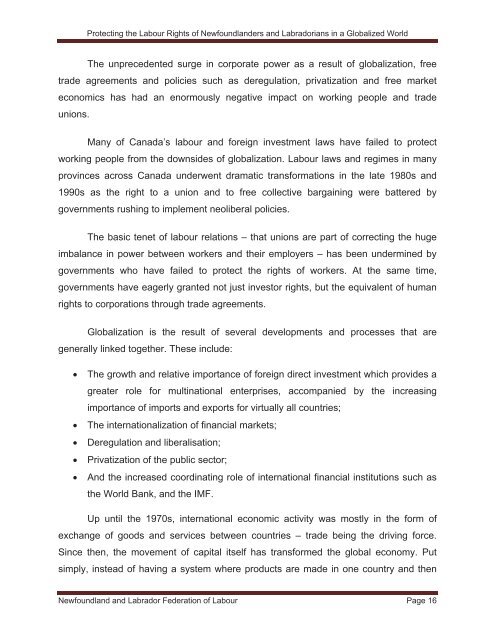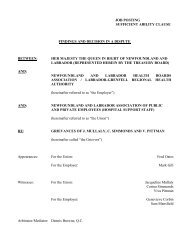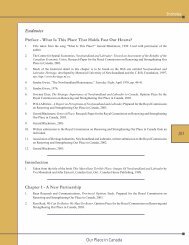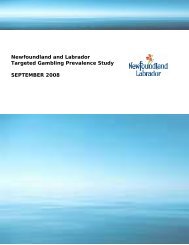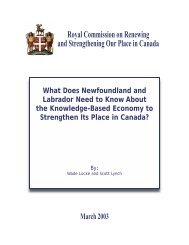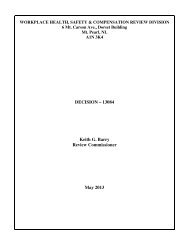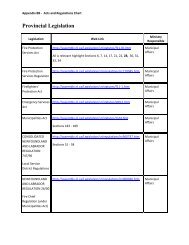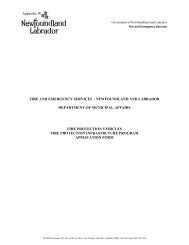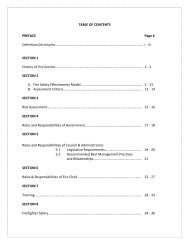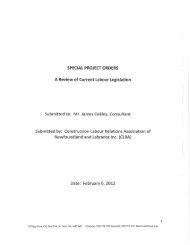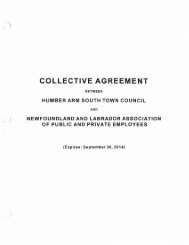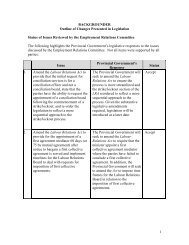January 7, 2011 - Government of Newfoundland and Labrador
January 7, 2011 - Government of Newfoundland and Labrador
January 7, 2011 - Government of Newfoundland and Labrador
Create successful ePaper yourself
Turn your PDF publications into a flip-book with our unique Google optimized e-Paper software.
Protecting the Labour Rights <strong>of</strong> <strong>Newfoundl<strong>and</strong></strong>ers <strong>and</strong> <strong>Labrador</strong>ians in a Globalized World<br />
<br />
The unprecedented surge in corporate power as a result <strong>of</strong> globalization, free<br />
trade agreements <strong>and</strong> policies such as deregulation, privatization <strong>and</strong> free market<br />
economics has had an enormously negative impact on working people <strong>and</strong> trade<br />
unions.<br />
Many <strong>of</strong> Canada’s labour <strong>and</strong> foreign investment laws have failed to protect<br />
working people from the downsides <strong>of</strong> globalization. Labour laws <strong>and</strong> regimes in many<br />
provinces across Canada underwent dramatic transformations in the late 1980s <strong>and</strong><br />
1990s as the right to a union <strong>and</strong> to free collective bargaining were battered by<br />
governments rushing to implement neoliberal policies.<br />
The basic tenet <strong>of</strong> labour relations – that unions are part <strong>of</strong> correcting the huge<br />
imbalance in power between workers <strong>and</strong> their employers – has been undermined by<br />
governments who have failed to protect the rights <strong>of</strong> workers. At the same time,<br />
governments have eagerly granted not just investor rights, but the equivalent <strong>of</strong> human<br />
rights to corporations through trade agreements.<br />
Globalization is the result <strong>of</strong> several developments <strong>and</strong> processes that are<br />
generally linked together. These include:<br />
The growth <strong>and</strong> relative importance <strong>of</strong> foreign direct investment which provides a<br />
greater role for multinational enterprises, accompanied by the increasing<br />
importance <strong>of</strong> imports <strong>and</strong> exports for virtually all countries;<br />
The internationalization <strong>of</strong> financial markets;<br />
Deregulation <strong>and</strong> liberalisation;<br />
Privatization <strong>of</strong> the public sector;<br />
And the increased coordinating role <strong>of</strong> international financial institutions such as<br />
the World Bank, <strong>and</strong> the IMF.<br />
Up until the 1970s, international economic activity was mostly in the form <strong>of</strong><br />
exchange <strong>of</strong> goods <strong>and</strong> services between countries – trade being the driving force.<br />
Since then, the movement <strong>of</strong> capital itself has transformed the global economy. Put<br />
simply, instead <strong>of</strong> having a system where products are made in one country <strong>and</strong> then<br />
<strong>Newfoundl<strong>and</strong></strong> <strong>and</strong> <strong>Labrador</strong> Federation <strong>of</strong> Labour Page 16


